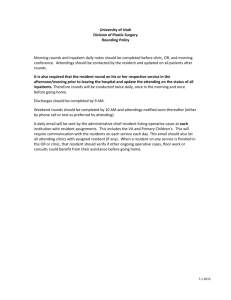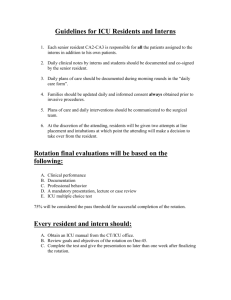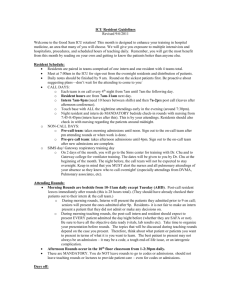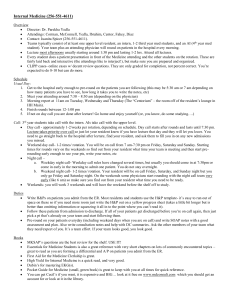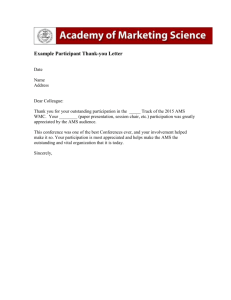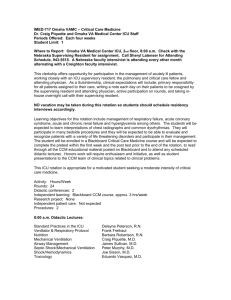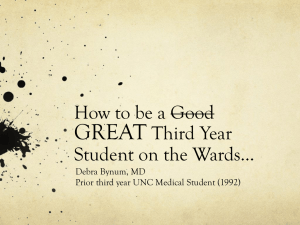Good Sam Wards - Goodsamim.com
advertisement
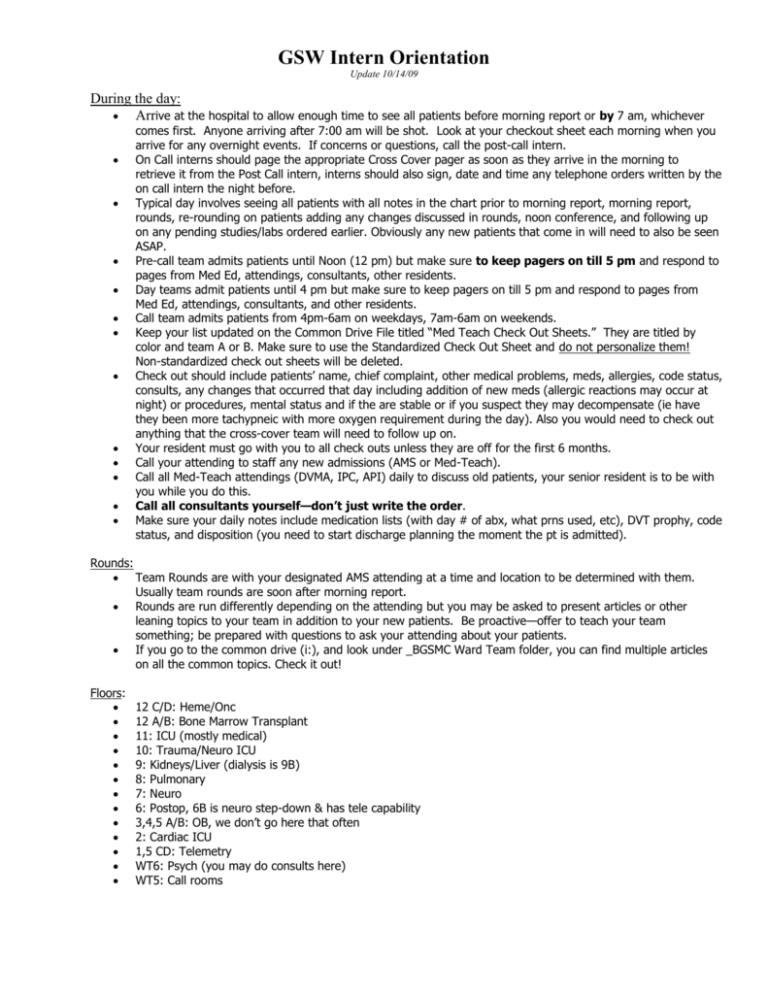
GSW Intern Orientation Update 10/14/09 During the day: Arrive at the hospital to allow enough time to see all patients before morning report or by 7 am, whichever comes first. Anyone arriving after 7:00 am will be shot. Look at your checkout sheet each morning when you arrive for any overnight events. If concerns or questions, call the post-call intern. On Call interns should page the appropriate Cross Cover pager as soon as they arrive in the morning to retrieve it from the Post Call intern, interns should also sign, date and time any telephone orders written by the on call intern the night before. Typical day involves seeing all patients with all notes in the chart prior to morning report, morning report, rounds, re-rounding on patients adding any changes discussed in rounds, noon conference, and following up on any pending studies/labs ordered earlier. Obviously any new patients that come in will need to also be seen ASAP. Pre-call team admits patients until Noon (12 pm) but make sure to keep pagers on till 5 pm and respond to pages from Med Ed, attendings, consultants, other residents. Day teams admit patients until 4 pm but make sure to keep pagers on till 5 pm and respond to pages from Med Ed, attendings, consultants, and other residents. Call team admits patients from 4pm-6am on weekdays, 7am-6am on weekends. Keep your list updated on the Common Drive File titled “Med Teach Check Out Sheets.” They are titled by color and team A or B. Make sure to use the Standardized Check Out Sheet and do not personalize them! Non-standardized check out sheets will be deleted. Check out should include patients’ name, chief complaint, other medical problems, meds, allergies, code status, consults, any changes that occurred that day including addition of new meds (allergic reactions may occur at night) or procedures, mental status and if the are stable or if you suspect they may decompensate (ie have they been more tachypneic with more oxygen requirement during the day). Also you would need to check out anything that the cross-cover team will need to follow up on. Your resident must go with you to all check outs unless they are off for the first 6 months. Call your attending to staff any new admissions (AMS or Med-Teach). Call all Med-Teach attendings (DVMA, IPC, API) daily to discuss old patients, your senior resident is to be with you while you do this. Call all consultants yourself—don’t just write the order. Make sure your daily notes include medication lists (with day # of abx, what prns used, etc), DVT prophy, code status, and disposition (you need to start discharge planning the moment the pt is admitted). Rounds: Team Rounds are with your designated AMS attending at a time and location to be determined with them. Usually team rounds are soon after morning report. Rounds are run differently depending on the attending but you may be asked to present articles or other leaning topics to your team in addition to your new patients. Be proactive—offer to teach your team something; be prepared with questions to ask your attending about your patients. If you go to the common drive (i:), and look under _BGSMC Ward Team folder, you can find multiple articles on all the common topics. Check it out! Floors: 12 C/D: Heme/Onc 12 A/B: Bone Marrow Transplant 11: ICU (mostly medical) 10: Trauma/Neuro ICU 9: Kidneys/Liver (dialysis is 9B) 8: Pulmonary 7: Neuro 6: Postop, 6B is neuro step-down & has tele capability 3,4,5 A/B: OB, we don’t go here that often 2: Cardiac ICU 1,5 CD: Telemetry WT6: Psych (you may do consults here) WT5: Call rooms GSW Intern Orientation Update 10/14/09 Parking garage: you can park on floors 2 and above—anywhere that says “doctor’s parking” but not “attending doctors” Admissions: Each admission must have the PCP documented, the AMS H &P form (if it is an AMS pt), and remember to complete ALL of the AMS form (including the Braden scale, family hx, etc). If the Pt has no PCP, please state so on the form. If you are unable to fit your assessment and plan on the AMS H&P form you can use a regular progress note to complete it. Each intern takes a max of 3 admissions per day on non-call. If the resident is off, the intern is still responsible for up to 3 admissions. If your resident is off you must staff new admissions with the other resident on your team color. If a patient is admitted while you are in clinic, you are still responsible for the H&P when you return. Your resident will write orders until you return. Each intern takes a max of 5 new admissions on call, 10 total for resident and two interns. Anything admitted above 10 is a hold-over. Any admissions occurring after 6am automatically are redistributed to the day time team (pre-call team). It is the responsibility of the overnight resident to see these patients to ensure they are stable and have appropriate orders until they can be seen by the daytime team. Admit stop time for the weekday teams is 4 pm. This is nonnegotiable. The pre-call team will stop taking admissions at 12:00 pm, but the other day teams must then accept patients until they are full. The on-call team starts taking weekday admissions when the day teams are all full OR it is 4pm, whichever comes first. Weekend teams admit from 7am to 6am. Interns will follow no more than 12 patients at one time. DVMA will be informed of the census of the AMS service as well as of individual call teams and will also be in contact with the chief regarding any issues that they see arising. If your AMS or DVMA patient is going to rehab (and your resident is off), call the DVMA pager for the number of the DVMA physician who will be taking the patient at rehab so you can give them a doc to doc about your patient Peri-operative AMS admissions must be staffed with attendings ASAP so that they can proceed with surgery. After 4 pm they should be staffed with the DVMA attending on call, as operative patients must be seen by an attending prior to a surgery. You are responsible for dictating discharge summaries if your resident is off. Patients must have a copy prior to them being allowed to leave the hospital. Keep in mind that this can take up to 4 hours, therefore as soon as you hear or suspect a patient will be discharged please dictate it ASAP. What is AMS/Who is an AMS Patient? AMS stands for Academic Medical Service. The majority of your patients will be on this service. You will round with an AMS attending daily (Bartz, Stander, Shinar, Holland, Huddleston, Houghton, Mallin, O’Malley, Novoa-Takara, and Stimson. The chiefs also serve as attendings on AMS—Goodwin, Judd, Paulson, Stiegler). 925 Clinic patients. IMC Clinic – Mary Ellen Dirlam, Harvey Hsu, Gary Salzman, Paul Stander, Chuck David, Heather Bartz, Sara Stimson. Hepatology (Mark Wong, Ester Little, Richard Manch, Alberto Ramos). Neurology patients (Dr. Hendin, Travis, Levine, Saperstein, Tamm). Peds Pulmonary (Dr. Adrienne O’Hagan, Gerry Gong, et al-from PCH) - Cystic fibrosis patients. Dr. Raul Romero (private practice). Hand/Plastic Surgery patients with Dr. Zoldos/Champagne group. Mountain Park Clinic. The faculty intensivists (Bajo, Raschke, O’Hea, Chu, Morro, Khazin, Long, Owen-Reece). Indian Health Services (IHS). Patients with Schaller-Anderson insurance (AMS is the only contracted provider). Consults from various sub-specialists (most frequently Trauma, psychiatry, OB, toxicology. No Doc: On some days (see schedule), we get patients who are “no-doc” or “unassigned” - these are patients whose have no PCP, their PCP doesn’t admit, and if they have insurance it doesn’t go to a particular hospitalist group that is contracted. They may or may not have insurance…they just don’t GSW Intern Orientation Update 10/14/09 have a doctor to admit them. The patient may have a subspecialist who knows them and are being admitted for an uncomplicated problem in that field. In that case, they should be admitted to the subspecialist with an IM consult if needed. The ER and your AMS attending should handle this. If you have a question, call your attending or take the patient and have them deal with it in the morning. No Doc days are split with DVMA (Desert Vista). No doc call goes from 7pm to 7pm and we alternate for first call from ED and first call from Outreach based on patient census. In addition to AMS patients, you will have some “Med Teach” patients. These patients are staffed with the DVMA, IPC, API hospitalist groups. You should call these attendings each day to staff your patients and to get teaching. You will not discuss these patients in your AMS rounds. ICU Transfers ICU Patients who transfer out and were seen by the ICU residents must have a transfer summary and orders written by one of the residents. Let the Chief know if this becomes an issue. If ICU residents did not follow the patient there may not be a Transfer Summary written. In this case, call the ICU Fellow or Attending who last saw the pt with questions (what needs to be followed up). For pts coming out the of ICU, an accept note should be written. This should include all of the info usually included in a daily progress note, but should also include a brief paragraph describing the presenting complaint and hospital course, list of consultants, list of procedures, med list. You must notify your resident immediately if you think a patient needs to go to the ICU. Indications for ICU admit: - Symptomatic Hypotension unresolved by IVF and/or with evidence of underperfusion such as AMS, oliguria, mottled skin, elevated serum lactate or need for vasopressors - Symptomatic Hypertension requiring antihypertensive infusions, arterial line BP monitoring, or frequent evaluations for symptoms (ie. neurochecks, chest pain assessments) - Symptomatic Arrythmias unstable afib that is not easily converted, refractory VT, symptomatic bradycardia/heart block, frequent SVT requiring repeated medication administration - Respiratory Distress RR>24 and/or SpO2<90 or SpO2 decreasing on face mask O2 - Need for intubation or invasive hemodynamic monitoring arterial line, PA catheterization - Need for dopamine or dobutamine drip titration more than every four hours - Need for RT treatment more than every 4 hours RT can briefly do q2 hour assessment/treatment - Need for full face mask BiPAP nasal CPAP/BiPAP can be done on the floor - Need for nursing care more than every 4 hours includes vital sign monitoring, neuro checks, accuchecks, etc - If the floor nursing staff feels uncomfortable with the disease process, stability, or other aspects regarding patient care *If in doubt, call the Rapid Response Team or page the Intensivist at 420-3649 On call: Please do NOT hesitate to call your resident for any questions, no matter what time it is!!! That is what they are there for. For the first few months, they may need to accompany you on many cross-cover calls. Your resident should accompany you on all admissions (unless extenuating circumstances). They should also write a brief admit note/addendum to your H&P. Make sure to ask for feedback from your resident regarding your notes and orders and presentations. DVMA attendings are always available for any questions, complicated cases, etc. on call nights. Residents may not “close the service” while on call. Residents are not allowed to refuse admissions. We understand there may be issues with one hospitalist or another, however these issues need to be documented and e-mailed to the chief. We will use these reports to determine which hospitalists/specialists/attendings should remain on the teach service and weed out those that abuse it. For now, please take the patient and report the problem in the morning. Update checkout sheets for any overnight events on patients you cross-covered (type in a different color in the last column—your resident will show you how). Call the team the next morning if there were any bounces or major issues. Be prepared to present your patients during post-call rounds the next day. Inappropriate cases and limits: GSW Intern Orientation Update 10/14/09 As a general guideline teams should carry only o 5 telemetry patients at a time. o 2 chemotherapy patients at a time (when only admitted for chemo, this does not include neutropenic fever). Some patients are not appropriate for teach such as: o Patients admitted for cardiac cath without active chest pain or ongoing ischemia. o Patients admitted for clotted AV grafts. o Patients admitted for initiation of HD without other active issues. Codes/Rapid Responses: DO NOT GO. These are the responsibility of the ICU team. This being said, you call the floor to make sure that it is NOT an AMS pt that is coding, if so if it is a cross-cover pt you need to contact your senior resident and go to the code. Once there, you are to stay OUTSIDE the room and let the ICU attending know what you know about the patient. If you are needed you will be asked to stay. Days off: Everyone must take 5 days off during the month. A calendar will be issued at the beginning of the rotation, which will be returned to the GS Admin Chief the afternoon of Resident switch day. Interns can take any noncall/nonpost call day off. You cannot take a day off when you are scheduled to have clinic, intern/resident teams should avoid taking weekdays off when their intern/resident has clinic. Interns should take weedays off, residents should take weenkends off if possible. If your senior is off during the weekday: o The co-resident will do admissions with the interns. If the resident is very busy, then the attending may be asked by the covering resident to do admissions with the intern. o A senior should not take the day off if their co-resident is in clinic that day, because this complicates the admission/staffing process. Conferences: Please be on time! Sign in as this counts as your attendance. Funding for board review is based on attendance. You are excused if you are in clinic, post-call, or off. Morning Report – 9-10 a.m. M-Th, Classroom C. Please participate in the case discussions! Noon Conference – 12-1 p.m. M-Th, Amphitheater. Grand Rounds – 8-9 a.m. Fridays, in the Amphitheater. You will likely need to come in early on these days to see all your patients before Grand Rounds. Discharges: All discharges now require a STAT (#9) discharge summary. Discharge summaries are expected to be ready in the computer 2-4 hours after dictation. The nurse can then transcribe any discharge instructions/medications on to the discharge paperwork. The patient will not receive a copy of the discharge summary unless it is directly ordered by the physician caring for the patient. Your Lawson number is your dictation code. If both residents have the same day off, the intern is responsible for the STAT discharge summary dictation. See orientation packet for details on items to include in the discharge summary as well as HIMS information about how to operate the dictation line. Please review your discharge summary before the patient leaves (especially medications and dosages) to verify correct transcription. If a correction or addition to discharge summary is needed, an addendum needs to be dictated and the change written on the instructions for the patient. (The addendum must be dictated, writing the change on the instructions is not enough). Do not attempt to make changes electronically as it will cause problems with viewing the summary later! Students: In general, 3rd year students see patients in conjunction with an intern while 4th year students act as subinterns with their own patients and work directly with the resident. The resident or intern must co-sign all notes and orders written by the medical student. GSW Intern Orientation Update 10/14/09 A daily SOAP note still needs to be written by the resident or intern, even though a medical student is following the patient. This also applies to 4th year students. The resident has the responsibility of working directly with the medical student. Interns need to focus on patient care and their other responsibilities. Even if a student performs a complete H & P, there still must be a complete H & P on the chart by either the intern or resident, same with progress notes. Students should follow no more than 3-5 patients 4th year students are considered subinterns and should stay overnight. 3rd year students are not expected to stay overnight on call but are free to stay if they wish (they may sleep in the med student call room). 3 rd year students should be encouraged to stay at least one call night during the month. This is a good opportunity for them to “bond” with the team, observe the intern’s thinking as they do cross-cover or admit additional patients, and attend codes. However, they are required to go to their lectures all the next day (if they have them) so this may limit their ability to stay. Students should only be off on weekend days due to lectures, am report, rounds during the week. Students will get at least 4 days off during the month. This means that they will be there at times when their assigned intern is not and don’t get a day off when the team is on Saturday call. If possible, the intern should let the student give the on-call intern “check-out” on the patients they are following. Stay excited about Internal Medicine and hopefully they will catch the “bug”. Radiology Ordering: Always provide a “reason for procedure” – be specific with regard to sign/symptom/underlying disease, do NOT use “rule out or R/O” Do not use abbreviations (ie. PE – pleural effusion or pulmonary embolism?) Other: All notes and orders must be signed, dated and timed. Please complete the “Who ya gonna call” form (accessed by going to your Ward Team Folder) and place in the front of each chart with every admission. AMS Consults for Psych, OB/Gyn, Surgery, etc as well as admit notes should be written up on the AMS H+P form. These are available on the common drive in the “Med Teach Check Out Sheets” folder. Please fill out the form COMPLETELY (including patient’s PCP, ROS and Family History). All procedures must have a “Time Out” form filled out and placed in the chart prior to performing the procedure. Please review the “Do Not Use” abbreviation list, and do not use the abbreviations on that list. AMS Patients admitted from 925 or IM clinic (Edwards building) should have the Pre-admission form filled out by the admitting resident/attending and faxed to the pod where the patient is being admitted. If an autopsy is going to be done on a patient you took care of (i.e one of your patients or a code you went to), you should write a note in the chart that you would like to be paged for the autopsy AND give the name, MR # and your name to Dr. McKellar. When the autopsy report becomes available, he will give you a copy to review. Regardless of the time you leave (i.e. pre-call), pagers must be on and pages answered until 5:00pm; the only exception is post call and you can turn your pager off at 1:00pm or when you leave. Cross cover: Do not have the nurse call an attending to ask a cross cover question. Go and review the chart, if you can’t find an answer then YOU CALL the attending to ask. This will improve resident ownership of patients, help patient care and give you practice for your future of covering your partners. It takes extra work but will have dividends in your future. When you are post call or planning on having the day off the following day, leave a little note at the end of your progress note stating, “I will be unavailable after 1 pm since post-call, please call cross cover A with questions or comments”. To better communicate with the consultants and attendings. Don’t forget to call all consultants yourself. Don’t just write an order, this is unacceptable. Remember that consultant orders must include both a specialty and a name. If you are not sure whom to call, ask your team members or attending. Articles on common inpatient topics are in the BGSMC_WARD_TEAM_FOLDER on the common drive. Review IM ward objectives attached to your evaluation forms. Make sure that you have your attending complete a direct observation form on one of your patient encounters during the month. You will be responsible for reminding your attending to do this and arranging the time.
